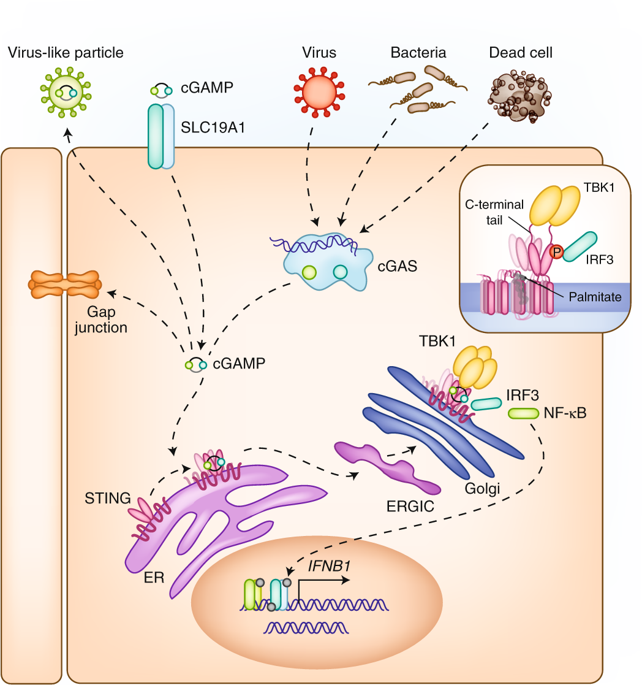当前位置:
X-MOL 学术
›
Nat. Immunol.
›
论文详情
Our official English website, www.x-mol.net, welcomes your
feedback! (Note: you will need to create a separate account there.)
Regulation of cGAS- and RLR-mediated immunity to nucleic acids.
Nature Immunology ( IF 27.7 ) Pub Date : 2019-12-09 , DOI: 10.1038/s41590-019-0556-1 Andrea Ablasser 1 , Sun Hur 2, 3
Nature Immunology ( IF 27.7 ) Pub Date : 2019-12-09 , DOI: 10.1038/s41590-019-0556-1 Andrea Ablasser 1 , Sun Hur 2, 3
Affiliation

|
Pathogen-derived nucleic acids are crucial signals for innate immunity. Despite the structural similarity between those and host nucleic acids, mammalian cells have been able to evolve powerful innate immune signaling pathways that originate from the detection of cytosolic nucleic acid species, one of the most prominent being the cGAS-STING pathway for DNA and the RLR-MAVS pathway for RNA, respectively. Recent advances have revealed a plethora of regulatory mechanisms that are crucial for balancing the activity of nucleic acid sensors for the maintenance of overall cellular homeostasis. Elucidation of the various mechanisms that enable cells to maintain control over the activity of cytosolic nucleic acid sensors has provided new insight into the pathology of human diseases and, at the same time, offers a rich and largely unexplored source for new therapeutic targets. This Review addresses the emerging literature on regulation of the sensing of cytosolic DNA and RNA via cGAS and RLRs.
中文翻译:

调节 cGAS 和 RLR 介导的核酸免疫。
病原体衍生的核酸是先天免疫的重要信号。尽管这些核酸与宿主核酸在结构上相似,但哺乳动物细胞已经能够进化出强大的先天免疫信号传导途径,这些信号传导途径源自胞质核酸种类的检测,其中最突出的途径之一是 DNA 和 RLR 的 cGAS-STING 途径-分别用于RNA的MAVS途径。最近的进展揭示了大量的调节机制,这些机制对于平衡核酸传感器的活性以维持整体细胞稳态至关重要。阐明使细胞能够维持对胞质核酸传感器活性的控制的各种机制,为人类疾病的病理学提供了新的见解,同时,为新的治疗靶点提供了丰富且很大程度上未经探索的来源。本综述讨论了有关通过 cGAS 和 RLR 调节胞质 DNA 和 RNA 传感的新兴文献。
更新日期:2019-12-11
中文翻译:

调节 cGAS 和 RLR 介导的核酸免疫。
病原体衍生的核酸是先天免疫的重要信号。尽管这些核酸与宿主核酸在结构上相似,但哺乳动物细胞已经能够进化出强大的先天免疫信号传导途径,这些信号传导途径源自胞质核酸种类的检测,其中最突出的途径之一是 DNA 和 RLR 的 cGAS-STING 途径-分别用于RNA的MAVS途径。最近的进展揭示了大量的调节机制,这些机制对于平衡核酸传感器的活性以维持整体细胞稳态至关重要。阐明使细胞能够维持对胞质核酸传感器活性的控制的各种机制,为人类疾病的病理学提供了新的见解,同时,为新的治疗靶点提供了丰富且很大程度上未经探索的来源。本综述讨论了有关通过 cGAS 和 RLR 调节胞质 DNA 和 RNA 传感的新兴文献。











































 京公网安备 11010802027423号
京公网安备 11010802027423号